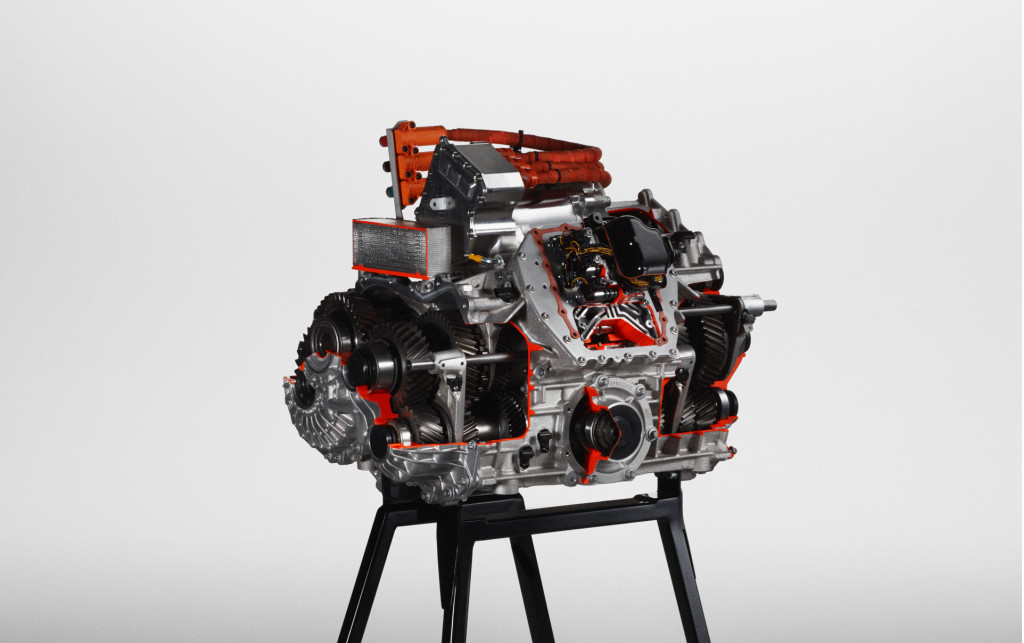Lamborghini on Tuesday provided the first details on its Aventador successor ahead of the car’s full reveal later this month.
The new supercar, code-named LB744, generates 1,000 hp from a sophisticated plug-in hybrid powertrain combining a newly developed V-12 engine, a new 8-speed dual-clutch automatic transmission, and three electric motors.
The output makes the LB744 the most powerful road car in Lamborghini’s 60-year history, and the layout of the motors (two at the front and one integrated with the rear, transverse-mounted transmission) means the car can operate in electric all-wheel-drive guise for short distances. Reverse mode is also handled exclusively by the front motors.
There’s no shaft connecting the mid-mounted engine with the front wheels. Instead, they are driven purely by electric power. It means the engineers were able to use the space normally reserved for a transmission tunnel for storage of a 3.8-kwh lithium-ion battery.
According to Lamborghini, the combined setup not only offers more power, but also around 30% fewer CO2 emissions than the Aventador Ultimae, the final version of the Aventador. The setup is also similar to what you find in Ferrari’s SF90 Stradale, although the Ferrari relies on a twin-turbo V-8 as the internal-combustion component.
The V-12 in the LB744, which carries its own L545 code name, matches the 6.5-liter displacement of the Aventador but is an entirely new design, only the third ground-up V-12 design in Lamborghini’s history. It weighs approximately 480 pounds, or 17 pounds less than the Aventador’s engine.
Lamborghini Aventador successor’s V-12 plug-in hybrid powertrain
The V-12 alone is a masterpiece, managing to generate a peak 813 hp at 9,250 rpm. Its peak torque of 535 lb-ft arrives at 6,750 rpm. Helping to increase the power are a higher compression ratio (now 12.6:1 compared to 11.8:1 in the Aventador) and improved air flow in the intake and exhaust systems.
On the electric side, a pair of oil-cooled axial flux motors at the front each generate a peak 148 hp and provide the car with torque vectoring at the front axle, as well as energy recovery under braking. The third motor, also rated at 148 hp, is integrated with the transmission and can supply power to the rear wheels under certain conditions, one of which is the aforementioned electric all-wheel-drive mode. In this mode, the car operates in front-wheel-drive mode but can activate the rear motor for all-wheel drive when necessary. The third motor also recovers energy and also serves as the engine’s starter motor.

Lamborghini Aventador successor’s V-12 plug-in hybrid powertrain
The transmission is also a new design for Lamborghini. It was developed in-house and replaces the jerky automated manual that featured in the Aventador. It will also feature in Lamborhini’s Huracán successor due in late 2024.
It’s both lighter (425 pounds including the rear motor) and faster shifting than the 7-speed dual-clutch transmission in the Huracán, thanks to some clever technology. There are two shafts (one for the odd gears and one for the even gears) that both connect to the same rotor, as opposed to the three-shaft design normally found in dual-clutch transmissions. The driver also has the ability to drop down multiple gears under braking simply by holding the left paddle shifter, a feature Lamborghini calls continuous downshifting.
